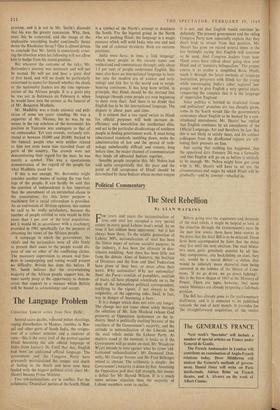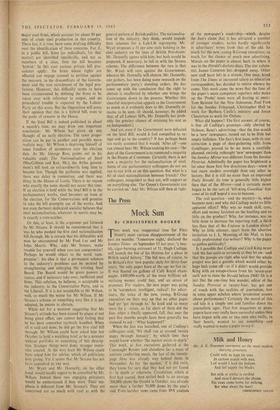Political Commentary
The Steel Rebellion
By ALAN WATKINS
Elm years and years the nationalisation of r iron and steel has occupied a very special corner in every good Labour man's mind. As an issue it has seldom been uppermost: but it has always been there. To the middle generation of Labour MPs, nationalisation of steel has been the litmus paper of serious socialist purpose; to the industry, it has been the ultimate in doc- trinaire meddling. And there has been little rest from the debate. Aims of Industry, the Institute of Directors and the Iron and Steel Federation have given of their best, or more often their worst. Why nationalise? Why not nationalise? Steel: the Facts—armfuls of pamphlets, sackfuls of tracts, all have plopped relentlessly on to the desk of the defenceless political correspondent, testifying to the vigour, if not always to the originality, of the opposing sides. Steel, in fact, was in danger of becoming a bore.
It is a danger which does not exist any longer. The change has not come about solely through the selection of Mr. Iain Macleod (whom God preserve) as Opposition spokesman on the in- dustry. Steel is politically exciting because of the smallness of the Government's majority, and the attitude to nationalisation of the Liberals and the steel rebels inside the Labour Party. As matters stand at the moment, it looks as if the Government will go under on steel. Mr. Woodrow Wyatt intends to vote against what he terms 'old- fashioned nationalisation'; Mr Desmond Don- nelly, Mr George Strauss and Mr Fred Bellenger intend to abstain. The arithmetic is simple : the Government's majority is down by five. Assuming the Opposition poll their full strength, this means a defeat for Mr Harold Wilson. It is a much more serious situation than the majority of Labour members seem to realise. Before going into the arguments and demands of the steel rebels, it might be helpful to look at the situation through the Government's eyes. In the past few weeks there have been stories in the press that the Steel Bill is to be delayed. These have been accompanied by hints that the delay may last until the next election. The steel Minis- ters seem quite genuinely puzzled by all this. Any compromise, any backsliding on steel, they say, would be a moral defeat a defeat that would be infinitely more shameful than being outvoted in the lobbies of the House of Com- mons. if we go down, we go down fighting': this is the brave slogan of 1965 at the Ministry of Power. There are signs, however, that more senior Ministers are already preparing a fall-back position.
The Bill has already gone to the parliamentary draftsman, and it is expected to be published towards the end of next month. 11 provides for the straightforward acquisition of the twelve major steel firms, which account for about 90 per cent of crude steel production in this country. There has, it is true, been some drafting difficulty over the identification of these concerns. For if, in a public bill, firms (or individuals, for that matter) are identified specifically, and not as members of a class, then the bill becomes 'hybrid.' In this case various private bill pro- cedures apply: the firms whose rights are affected can engage counsel to petition against the measure, to the discomfiture of the Govern- ment and the vast enrichment of the legal pro- fession. However, this difficulty seems to have been circumvented by defining the firms to be taken over with reference to output, and no procedural trouble is expected by the Labour Party on this score. But the Opposition will press their opinion that this is a hybrid bill, even to the point of censure in the House.
If the Steel Bill is indeed published in about a month's time, we may draw one important conclusion: Mr Wilson has given up any thought of an early election. The same propo- sition can be put in another and possibly more realistic way: Mr Wilson is depriving himself of some freedom of manoeuvre over the election date. As Mr. George Ross points out in his valuable study The Nationalisation of Steel (MacGibbon and Kee, 30s.), the Attlee govern- ment's bill took an extraordinarily long time to become law. Though the guillotine was applied, there was delay in committee, and there was delay in the House of Lords. There is no reason why exactly the same should not occur this time. If an election is held while the Steel Bill' is in the parliamentary works, steel becomes an issue at the election, for the Conservatives will promise to take the bill promptly out of the works. And not even themost dedicated socialist believes that steel nationalisation, whatever its merits may be, is exactly a vote-catcher.
Or this, at least, is the argument put forward by Mr Strauss. It should be remembered that it was he who pushed the first steel nationalisation bill through. He is certain that his difficulties will now be encountered by Mr Fred Lee and Mr John , Morris. Why, asks Mr Strauss, make trouble for yourself when you can compromise?
Perhaps he would object to the word 'com- promise': his idea is that a permanent solution to the industry's problems can be secured by strengthening and enlarging the existing Steel Board. The Board would be given powers to coerce, and if necessary take over, inefficient steel firms. This solution, he believes, is acceptable to the industry, to the Conservative Party, and to the Liberals. If it is not acceptable to Mr Wilson, well, so much the worse for Mr Wilson. If Mr Strauss's scheme or something very like it is not adopted, he means to abstain.
While not for a moment suggesting that Mr Strauss's attitude has been caused by pique at not being given office, one cannot help feeling that he has been somewhat tactlessly handled. When all is said and done, he did get the first steel bill through. Mr Wilson could have asked him last October to hold a watching brief or be a minister without portfolio or something of this descrip- tion. Stranger things were done, stranger minis- tries created. At the very least Mr Wilson could have asked him for advice, which all politicians love giving. Yet it seems that Mr Strauss has not bean .consulted in any way.
Mr. Wyatt and Mr. Donnelly, on the other hand, would hardly expect to be consulted by Mr.
Wilson. Indeed these two engaging privateers, would be embarrassed if they were. Their em- phasis is different from Mr. Strauss's. They are concerned not so much with steel as with the
general pattern of British politics. The nationalisa- tion of the industry, they think, would impede their schemes for a Lab-Lib regrouping. Mr. Wyatt proposes a 51 per cent state holding in the steel industry on the lines of British Petroleum; Mr. Donnelly agrees with him; but both would be prepared, if necessary, to fall in with the Strauss scheme. The difference between the two is that Mr. Wyatt will vote against the Government, whereas Mr. Donnelly will abstain. Mr. Donnelly, one gathers, has been doing some research on the parliamentary party's standing orders. He has come up with the conclusion that the right to abstain is unaffected by whether one brings the Government down in the process. Whether this cheerful interpretation appeals to the Government as much as it evidently does to Mr. Donnelly re- mains to be seen. (It should, however, be added that, of all Labour MPs, Mr. Donnelly has prob- ably the greatest chance of retaining his seat as an Independent) And yet, even if the Government were defeated on the Steel Bill, would it feel compelled to re- sign and go to the country? It has perhaps been too easily assumed that it would. 'After all'—one can almost hear Mr. Wilson making his case—'the duty of the Government is to command a majority in the House of Commons. Certainly there is not now a majority for the nationalisation of steel. Some of our parliamentary colleagues do not see eye to eye with us on this question. But what is a bit of steel nationalisation between friends? Our colleagues, misguided as they are, will support us on everything else. The Queen's Government can be carried on.' And Mr. Wilson will then sit tight.



































 Previous page
Previous page